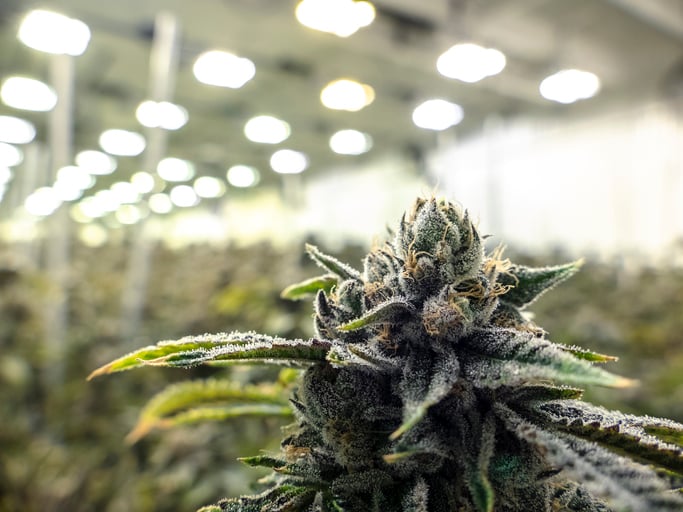If you've been having a hard time trying to escape cannabis content over the last couple of months, there's a very good reason for that.
On June 19, Canada's Parliament officially passed the Cannabis Act (bill C-45), paving a path for our neighbor to the north to become the first industrialized country to have legalized adult-use marijuana. Prime Minister Justin Trudeau set an official legalization date of Oct. 17, 2018. That means we're less than two months away from recreational marijuana being legal and going on sale in licensed dispensaries.

Image source: Getty Images.
Legalization is about way more than just dried cannabis
As you can rightly imagine, giving the green light to recreational weed will open the floodgates to potentially billions of dollars in annual revenue. This is the primary reason why Canadian marijuana stocks have soared to the heavens since the beginning of 2016.
But the fact of the matter is that legalizing adult-use pot will be about a lot more than just dried flower. Though there isn't a precedent to a country like Canada legalizing recreational cannabis, we can learn a lot by looking at how growers responded in Colorado, Washington, and Oregon following their state-level recreational legalizations.
In each and every instance, the per-gram price for dried cannabis began plunging, precipitously, within a few months of hitting dispensary shelves. Whether it's bigger growers purposefully driving down margins to push smaller players out of businesses or a complete disregard for planning or the supply-and-demand outlook, what limited history we have has shown that dried cannabis can be commoditized. As a result, pot stocks that lean too heavily on dried flower could be in for an unpleasant surprise with regard to their gross margin.
Instead, cannabis growers of all sizes are looking to diversify their product lines to ensure a nice mix of high-margin products. I often refer to these as "alternative cannabis products," and they include oils, edibles, infused beverages, concentrates, and vaporized cartridges, to name a few. Businesses that focus on these alternative products should be able to do more with each dollar in revenue than those with a large reliance on dried cannabis.

Image source: Getty Images.
It's on like Donkey Kong between Canada's two biggest pot stocks
Not surprisingly, Canada's two marijuana kingpins -- Canopy Growth Corp. (CGC +0.00%) and Aurora Cannabis (ACBFF 2.48%) -- have taken this focus on alternatives to heart. In fact, following a long-awaited regulatory approval from Health Canada for Aurora Cannabis, they're now on a collision course to clash over a high-margin product: softgel capsules for medical marijuana patients.
Last Wednesday, Aug. 22, Aurora Cannabis issued a press release announcing that Health Canada had approved its request to produce softgel capsules at its Aurora Vie facility in Quebec.
For those who many not recall, among Aurora's plethora of deals and partnerships this year was a June cash-and-stock investment of 10 million Canadian dollars ($7.7 million) in privately held softgel capsules manufacturer Capcium, which worked out to a 19.99% stake. Capcium's manufacturing facility won't be complete until the fourth quarter of 2019, so Aurora Cannabis retooled its Aurora Vie facility as a temporary location for Capcium to produce its products.
Additionally, Aurora Cannabis announced in the same press release that it launched a line of hard-shell, vegan medical cannabis capsules that contain equal parts of tetrahydrocannabinol (THC) and cannabidiol (CBD). THC is the psychoactive component of the cannabis plant that gets you "high," while CBD is the nonpsychoactive components best known for its perceived medical benefits. This vegan-based capsule line was acquired when Aurora gobbled up CanniMed Therapeutics for $852 million earlier this year.
Why does this matter? Roughly a year ago, Canopy Growth Corp. launched its own line of softgel capsules, and while the company doesn't specifically break out what percentage of sales the capsules represent, in its fiscal first-quarter operating results, we learned that 26% of its CA$25.9 million in sales were derived from oils. Not to mention that Canopy Growth also has 1,055 kilograms of softgel capsules in its inventory as of the end of its most recent fiscal quarter.

Image source: Getty Images.
A war over softgel capsule market share doesn't mean there'll be a loser
It's pretty clear that these two appear to be headed for an all-out market share turf war over softgel capsules. But does that mean there has to be a loser? Not necessarily.
Remember, this legalization is about much more than just the domestic Canadian market. These major growers are looking to export their product to foreign countries that've legalized medical marijuana. There are about 30 countries worldwide to have done so.
What's interesting, though, is that not every country that's passed sweeping medical marijuana laws has given the thumbs-up to dried cannabis. Nor do physicians really like the idea of patients consuming a drug by smoking it. Meanwhile, practically every legal country OK's the use of cannabis oils and therefore softgel capsules. There's a big market opportunity for medical cannabis capsules overseas, especially with foreign countries having relative nascent or nonexistent grow facilities of their own.
Ultimately, there just might be room enough for both of these cannabis kingpins to thrive without having to step on each other's toes. Of course, only time will tell.







